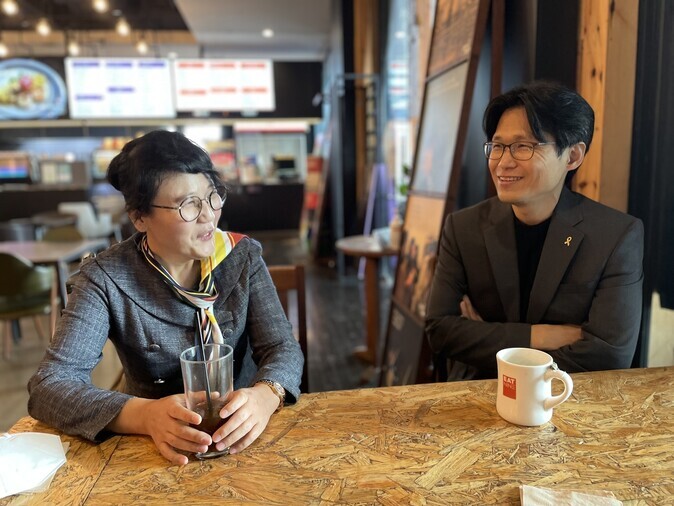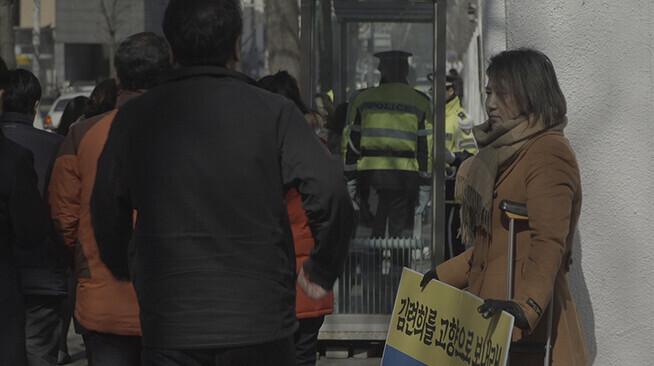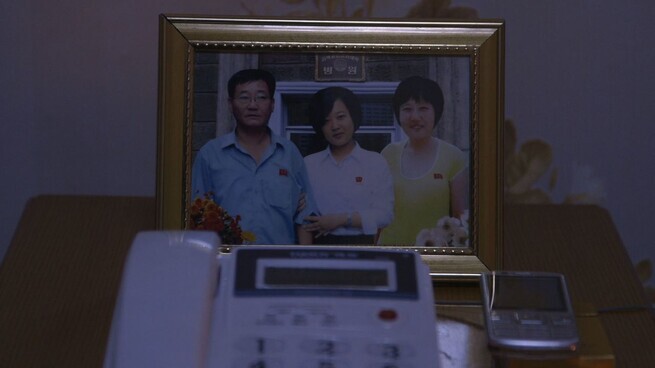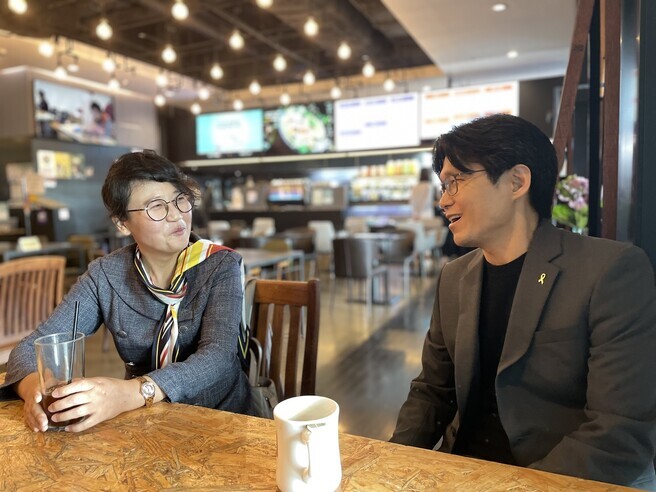hankyoreh
Links to other country sites 다른 나라 사이트 링크
[Interview] A N. Korean mother’s quest to return home to Pyongyang

“I was an ordinary Pyongyang mother with a daughter,” Kim Ryun-hee recounts in “Shadow Flowers,” a documentary on her life by director Yi Seung-jun that premiered in South Korea on Wednesday. Kim, 52, was the first North Korean defector to request repatriation to the North.
“My husband was a doctor at a hospital affiliated with the Kim Chaek University of Technology, and I worked at a dress shop. I’d been having problems with my liver, and I underwent treatment in Pyongyang. But when it didn’t get better, I decided to go visit relatives in China for two months to recuperate in May 2011. The hospital costs in China were so much more expensive than in North Korea. I worked at a restaurant in China to earn money to go back to North Korea, and that’s when I met the defection broker. They told me, ‘You can earn big money working in South Korea for just a short time.’ So I handed over my North Korean passport, and by the time I thought better of it, it was already too late.”
Speaking to the Hankyoreh alongside Yi on Monday at the Atnine Film offices in Seoul’s Sadang neighborhood, Kim seemed like a good-natured stay-at-home mother type.

In September 2011, Kim arrived in South Korea against her wishes, having been taken in by a defection broker. From her very first National Intelligence Service questioning upon her arrival, she has consistently demanded to be sent back, but her requests have been refused. According to the law, she is considered a citizen of the Republic of Korea, and there is no precedent of a North Korean defector being repatriated.
Deciding that she needed to take action to be able to return to her family, Kim looked into smuggling and fake passports. Hoping to earn herself a deportation, she turned herself in for “espionage activities” — collecting intelligence from other defectors — and underwent punishment.
Kim’s story first garnered widespread attention in South Korea through a Hankyoreh report published in July 2015. After reading the article, Yi contacted Kim and began producing the documentary.
Yi became the first South Korean to be nominated for an Academy Award in the Best Documentary (Short Subject) category last year with “In the Absence,” an examination of the 2014 Sewol ferry sinking.
During the eighth month of shooting, in March 2016, Kim visited the Vietnamese embassy to apply for asylum.
“I asked them to send me to North Korea, but they refused. Based on that and messages I had written about North Korea on Facebook and other places, the Daegu District Prosecutors’ Office indicted me without questioning in December of last year for violating the National Security Act,” she explained.
“The trial was supposed to take place in January, but it’s been indefinitely postponed. I got my passport in May 2018, but I’ve been under an exit ban for three years for ‘violating the National Security Act.’”

In the meantime, a new administration came to office and the South and North Korean leaders held multiple summits, but her situation didn’t change.
Over the past decade, South Korean society has remained unremittingly antagonist toward her. What has kept her going all the while is the goodwill shown to her by others in the South.
“Chairperson Kwon Oh-hyeon and the other members of the NGO for Prisoners of Justice, Peace and Human Rights have been like family to me here in the South,” she said.
“They gave me a place to stay and looked after me when I was drifting around without a home. I recently had surgery for liver cancer, and they cared for me. They really felt like family.”
Despite her struggles, life goes on. Even as “Shadow Flowers” looks at the anguish of Kim’s family members who have been separated from her, it also shares a warm perspective on its subjects’ daily lives.
Used to eating alone after coming home from her factory job, Kim meets up for the first time in years with other defectors who arrived alongside her, and they share conversation and words of comfort.
The same is true for Kim’s family back in Pyongyang. A Finnish documentary filmmaker and acquaintance of Yi’s twice received permission from North Korean authorities to shoot in Pyongyang, with scenes showing Kim’s family members eating meals and going about their lives as they await her return.
“People in North Korea and defectors from North Korea are very ordinary people going about their lives just like us,” Yi said.
“I really wanted to include that footage in Pyongyang because the aim of this film is to show how we’re all similar, how we’re not any different from them.”

On the topic of the Pyongyang scenes, Kim was asked whether her husband’s job as a doctor meant that they were part of the middle class.
“We weren’t middle class,” she replied. “Unlike the South, doctors in North Korea are just government employees.”
“I made more money than my husband working at a dress shop,” she added.
Is there any way available for Kim to return to her family?
“I hope to see the South Korean government be more charitable in their approach now,” Yi said.
“It seems like they worry that if they repatriate her, it will be exploited for propaganda for the North Korean regime. But couldn’t they just say, ‘So be it’?”
“They also said that if they send Kim Ryun-hee back, other North Korean defectors will also want to be sent back, but that’s the humanitarian thing to do: hold reviews and send back the people who really want to go.”
As the interview finished up, Kim noted, “I see a lot of negative posts calling the director a ‘commie’ and whatnot.”
“I’d like to ask those people what they would do if their family member was being held in the North. I hope they’ll see it as the story of a mother who wants to go back to her family.”
By Oh Seung-hun, staff reporter
Please direct questions or comments to [english@hani.co.kr]

Editorial・opinion
![[Column] Season 2 of special prosecutor probe may be coming to Korea soon [Column] Season 2 of special prosecutor probe may be coming to Korea soon](https://flexible.img.hani.co.kr/flexible/normal/500/300/imgdb/original/2024/0426/3317141030699447.jpg) [Column] Season 2 of special prosecutor probe may be coming to Korea soon
[Column] Season 2 of special prosecutor probe may be coming to Korea soon![[Column] Park Geun-hye déjà vu in Yoon Suk-yeol [Column] Park Geun-hye déjà vu in Yoon Suk-yeol](https://flexible.img.hani.co.kr/flexible/normal/500/300/imgdb/original/2024/0424/651713945113788.jpg) [Column] Park Geun-hye déjà vu in Yoon Suk-yeol
[Column] Park Geun-hye déjà vu in Yoon Suk-yeol- [Editorial] New weight of N. Korea’s nuclear threats makes dialogue all the more urgent
- [Guest essay] The real reason Korea’s new right wants to dub Rhee a founding father
- [Column] ‘Choson’: Is it time we start referring to N. Korea in its own terms?
- [Editorial] Japan’s rewriting of history with Korea has gone too far
- [Column] The president’s questionable capacity for dialogue
- [Column] Are chaebol firms just pizza pies for families to divvy up as they please?
- [Column] Has Korea, too, crossed the Rubicon on China?
- [Correspondent’s column] In Japan’s alliance with US, echoes of its past alliances with UK
Most viewed articles
- 11 in 5 unwed Korean women want child-free life, study shows
- 2‘We must say no’: Seoul defense chief on Korean, USFK involvement in hypothetical Taiwan crisis
- 3AI is catching up with humans at a ‘shocking’ rate
- 4[Column] Can we finally put to bed the theory that Sewol ferry crashed into a submarine?
- 5[Editorial] Yoon cries wolf of political attacks amid criticism over Tokyo summit
- 6The dream K-drama boyfriend stealing hearts and screens in Japan
- 7[Photo] “Comfort woman” survivor calls on president to fulfill promises
- 8[Editorial] Was justice served in acquittal of Samsung’s Lee Jae-yong?
- 9[Column] Has Korea, too, crossed the Rubicon on China?
- 10Doubts remain over whether Yoon will get his money out of trip to Japan